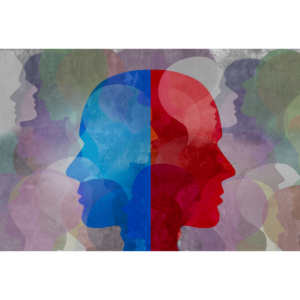Understanding Schizophrenia: An Overview
This article is based on a past Hot Topics Facebook Live video event with Dr. David Benrimoh, Susan Doherty, and Tony Alfonso. Watch the recording: click here.
What is schizophrenia?
Schizophrenia is a disorder that causes changes in feelings, emotions, and thought patterns. Characteristic symptoms of schizophrenia are psychotic symptoms, such as delusions and hallucinations, and feeling disconnected from reality. There are three symptom categories: positive symptoms, such as hallucinations; negative symptoms, such as apathy and lack of motivation; and cognitive symptoms, such as lack of concentration and disorganized thoughts. Schizophrenia is a spectrum: each individual will be affected in different ways, some more severely than others, and recovery will look different for each person. It is normal that some people will recover faster and more easily, while others might have more difficulty.
Is schizophrenia hereditary?
If you have a family member with schizophrenia or any other type of psychotic disorder, then you may have a genetic predisposition to the disorder. However, there is not one “schizophrenia gene” and environmental factors also play an important role in the disorder’s development. These environmental factors include pregnancy and birth conditions and complications, early childhood experiences, and even the month you were born in. Many factors need to be considered when calculating an individual’s risk of developing schizophrenia.
How are schizophrenia and schizoaffective disorder different?
Schizophrenia is a psychotic disorder because it presents psychotic symptoms, such as delusions and auditory and visual hallucinations. Schizoaffective disorder presents with both psychotic and mood disorder symptoms occurring simultaneously. For instance, if you have hallucinations and you experience depression at the same time, it may be schizoaffective disorder.
Is medication absolutely necessary for the treatment of schizophrenia?
This depends on the affected individual. Some people with mild symptoms can recover with appropriate medical intervention without medication. There are some people for whom medication does not work, and others do not want to take medication and explore other treatments, such as talk therapy. However, the majority of people with schizophrenia do take medication. For some, medication can change their lives significantly. Whether the person with schizophrenia takes medication or not, it is important that they are followed by a doctor, and no one should start or stop a treatment plan without consulting a health care professional. Doing so can result in serious negative outcomes.
What if someone with schizophrenia refuses treatment?
Some people do not want treatment for their schizophrenia, and as long as they are safe and not a danger to themselves or others, they have the right to refuse treatment. However, it is possible for an untreated person with schizophrenia to receive court-ordered treatment if their symptoms are putting themselves or others in danger.
Is drug-induced schizophrenia the same as “regular” schizophrenia?
Some people will present with psychotic symptoms after taking drugs while others will not. Likewise, not everyone who has psychotic symptoms after taking drugs will develop chronic schizophrenia. However, for people at risk of developing schizophrenia, a drug-induced psychosis can indicate a person is developing schizophrenia. For example, a Scandinavian study found that 44% of subjects who experienced a first psychotic episode after smoking cannabis went on to develop schizophrenia. This means that drug use can be a stressor that triggers the disorder.
While there is currently no way to identify those at risk of developing psychosis or schizophrenia after drug use, we do know there is a link between the use of cannabis and psychosis. If a person is at risk of developing schizophrenia, the younger they are when they start using cannabis, the greater the risk of developing the disorder.
Does drug-induced schizophrenia happen only when the person is taking illicit drugs?
Drug-induced schizophrenia can occur with either legal or illegal drugs. As we’ve mentioned, cannabis use can result in psychosis. Stimulants, such as cocaine, amphetamines, and speed, can trigger an episode. Likewise, some prescription drugs, such as corticosteroids, can increase risk. Any drug can be a trigger if a person has a predisposition for developing schizophrenia.
What is “flat affect”?
A “flat affect” is when a person does not show the usual signs of emotion. For instance, they may feel happy on the inside, but they do not express how they feel on the outside by smiling or laughing. A flat affect can happen when someone is overmedicated or it can result from the disorder itself. Many antipsychotic medications act as sedatives. They are used to treat the positive symptoms of schizophrenia, and if the dose is too high, they may cause a flat affect. However, there are other people who have a flat effect at the onset of schizophrenia which improves with medication. If a person presents with a flat affect at the onset of the disorder and this does not improve after medication, the flat affect is likely a symptom of their disorder, not the medication.
Does stopping and starting the use of a medication affect its efficacy? Will it adversely affect the development of the illness?
Stopping and starting medication without the supervision of a medical professional can reduce a medication’s effectiveness and symptoms can worsen if medication is used inconsistently. Medications have to be at a certain level in the body for a certain amount of time in order to be truly effective.
– Gabrielle Lesage
From Share&Care Winter 2022
Find help for schizophrenia: amiquebec.org/schizophrenia.



